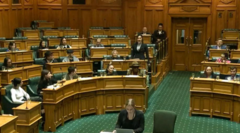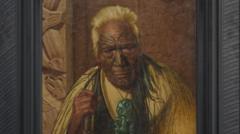On November 15, 2024, the New Zealand Parliament witnessed an unprecedented moment as Māori lawmakers led by Hana-Rawhiti Maipi-Clarke performed a haka—a traditional ceremonial dance—amidst a heated debate regarding a bill that seeks to redefine the Principles of the Treaty of Waitangi, New Zealand’s founding document signed in 1840 between Māori chiefs and the British Crown. The protest erupted during the first reading of the legislation, which lawmakers believe undermines Indigenous rights and perpetuates ongoing colonization issues.
When called upon to express how her party, Te Pāti Māori, would vote on the bill, Maipi-Clarke tore up the document in front of assembled members, igniting a wave of protest. Other opposition lawmakers and attendees in the gallery joined her in the haka, symbolizing a powerful cultural statement against the proposed changes that could endanger decades of progress towards reconciling historical wrongs against the Māori people.
The Speaker of the House, Gerry Brownlee, deemed the action “disrespectful,” leading to the suspension of Maipi-Clarke. This legislative proposal, introduced by the Act Party—a right-wing coalition member—intends to establish “equal rights” for all New Zealanders, rejecting provisions based on ethnicity that they claim have created societal division. Opponents warn that the bill might irreversibly harm race relations in New Zealand, reversing efforts to address historical inequalities faced by Māori.
Public outcry against the bill has intensified, with thousands participating in national demonstrations marching towards Wellington, the nation’s capital. The National Party, despite initially agreeing to their coalition partners' proposals, has attempted to dissociate from the legislation. Prime Minister Christopher Luxon expressed a desire to halt the bill's progression, emphasizing that it oversimplifies a complex issue that has been discussed for over a century and a half.
As the debate continues, attention remains on how the government will address the pressing concerns of the Indigenous Māori community in the face of proposed legislative changes that threaten their rights and heritage.
When called upon to express how her party, Te Pāti Māori, would vote on the bill, Maipi-Clarke tore up the document in front of assembled members, igniting a wave of protest. Other opposition lawmakers and attendees in the gallery joined her in the haka, symbolizing a powerful cultural statement against the proposed changes that could endanger decades of progress towards reconciling historical wrongs against the Māori people.
The Speaker of the House, Gerry Brownlee, deemed the action “disrespectful,” leading to the suspension of Maipi-Clarke. This legislative proposal, introduced by the Act Party—a right-wing coalition member—intends to establish “equal rights” for all New Zealanders, rejecting provisions based on ethnicity that they claim have created societal division. Opponents warn that the bill might irreversibly harm race relations in New Zealand, reversing efforts to address historical inequalities faced by Māori.
Public outcry against the bill has intensified, with thousands participating in national demonstrations marching towards Wellington, the nation’s capital. The National Party, despite initially agreeing to their coalition partners' proposals, has attempted to dissociate from the legislation. Prime Minister Christopher Luxon expressed a desire to halt the bill's progression, emphasizing that it oversimplifies a complex issue that has been discussed for over a century and a half.
As the debate continues, attention remains on how the government will address the pressing concerns of the Indigenous Māori community in the face of proposed legislative changes that threaten their rights and heritage.



















